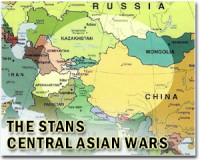| . |  |
. |
Kabul (AFP) Nov 28, 2010 The US-led war in Afghanistan is now longer than the Soviets' futile campaign in the benighted nation -- and after nine years and 50 days of battle, the West is also groping for an exit. Afghanistan's brutal terrain remains littered with the rusting hulks of Russian tanks captured during the 1979-89 war, and is now testing more than 140,000 US-led forces fighting rebel guerillas to keep their own ally in power. After NATO announced plans to end its combat mission by 2014, many of those who lived through the Soviet years say they remember similar attempts to build up local security forces and manage a dignified withdrawal. While troops are making some gains against Taliban insurgents in pockets of the restive south and east of the country, progress remains uneven and violence is at an all-time high, the Pentagon admitted in a report last week. The International Crisis Group says the coalition's strategy to break the Taliban, build popular support among civilians, woo disenchanted rebels and boost Afghan security forces is failing. Afghan security forces "have proven a poor match for the Taliban", the Brussels-based ICG said in a report issued Sunday, after the milestone of nine years and 50 days was reached on Friday. "Without outside support, (President Hamid Karzai's) government would collapse, the Taliban would control much of the country and internal conflict would worsen, increasing the prospects of a return to the destructive civil war of the 1990s," the report said. The civil war followed the Soviet withdrawal, as warlords and rival factions fought first against a weak Moscow-backed regime and then among each other for the spoils of power. The Taliban came to power in 1996, and were initially welcomed by many Afghans for bringing an end to the chaos with their militant brand of Islamist government. Former Soviet Union leader Mikhail Gorbachev, who withdrew his country's troops from Afghanistan, last month told the BBC that victory for NATO was "impossible" as the coalition faces record deaths, and as the military tries to convince a war-weary Western public that they should stay the course. The Russians waged a far bloodier war, with more than one million people killed in the decade of fighting. "Village after village was evacuated because of heavy indiscriminate bombing of the Soviets. They were brutal," said Nader Nadery, who sits on the Afghanistan Independent Human Rights Commission. "The coalition forces are much more selective, much more targeted," he said. Civilian casualties are a thorny issue for NATO, with many Afghans blaming it for a rise of a third in civilian deaths in the first six months of 2010, to 1,271. The vast majority of deaths, however, are caused by insurgents. Nadery noted that the toll is massively lower than two decades ago and no more than 15,000 people have lost their lives since the US-led invasion of Afghanistan in late 2001 that toppled the Taliban regime. "Yes, there's anger when it comes to civilians being harmed... but this comes from the fact that expectations are much higher now," he said. Another difference is that the Russians and the communist government in Kabul fought against a broad and relatively unified alliance of anti-Soviet "mujahedeen" forces. The Americans in comparison, while fighting largely ethnic Pashtun Taliban militants, face a fragmented social landscape, which has made it difficult for troops to distinguish the enemy and find strong local allies. "The Americans' problem is that their Afghan allies are not united. There are different groups seeking their own benefits," said Afghan analyst Mohammad Younus Fakur, who worked as a civil servant during the Soviet period. The complicated political picture could make leaving a trickier task for the Americans than the Russians, who negotiated their exit with Afghanistan's neighbours before leaving. At a summit in Lisbon last week, NATO agreed to end its combat mission by the end of 2014, when it said it would transfer full responsibility for security to Afghan forces. But Candace Rondeaux, senior analyst on Afghanistan for the ICG, said: "The Americans don't really fully have an understanding of the dimensions of different political players that would be involved in such a settlement. "The Russians had a far greater political sophistication.... I think we'll see a lot of confusion the closer we get to 2014 because the Americans just don't have the cultural understanding they need to properly negotiate an exit."
Share This Article With Planet Earth
Related Links News From Across The Stans
 Progress 'uneven' in Afghanistan war: Pentagon
Progress 'uneven' in Afghanistan war: PentagonWashington (AFP) Nov 23, 2010 The Pentagon admitted Tuesday in a report that progress has been "uneven" in the war in Afghanistan, with only modest gains against the Taliban insurgency despite a surge of US and NATO troops. The cautious tone of the report offered a contrast to more upbeat public declarations from top officials and military leaders, who have touted encouraging signs and said the US military has gained the ... read more |
|
| The content herein, unless otherwise known to be public domain, are Copyright 1995-2010 - SpaceDaily. AFP and UPI Wire Stories are copyright Agence France-Presse and United Press International. ESA Portal Reports are copyright European Space Agency. All NASA sourced material is public domain. Additional copyrights may apply in whole or part to other bona fide parties. Advertising does not imply endorsement,agreement or approval of any opinions, statements or information provided by SpaceDaily on any Web page published or hosted by SpaceDaily. Privacy Statement |